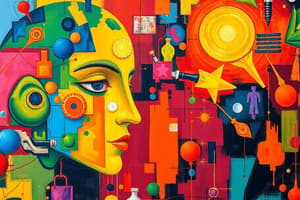Podcast
Questions and Answers
How can AI contribute to poverty reduction?
How can AI contribute to poverty reduction?
- Identifying areas of high need through satellite imagery analysis (correct)
- Predicting food crises through machine learning
- Enhancing social media engagement in underdeveloped areas
- Optimizing agricultural practices using genetic data
How does AI help in reducing waste in the food supply chain?
How does AI help in reducing waste in the food supply chain?
- Creating more appealing food presentations
- Developing new food preservation methods
- Tracking inventory levels and forecasting demand (correct)
- Training chefs on the latest culinary trends
What is one way AI can assist in achieving Zero Hunger?
What is one way AI can assist in achieving Zero Hunger?
- Increasing crop productivity through precision farming techniques (correct)
- Improving food packaging design
- Analyzing consumer behavior for marketing purposes
- Enhancing taste profiles of food products
What aspect of healthcare is revolutionized by AI according to the text?
What aspect of healthcare is revolutionized by AI according to the text?
Which area can AI potentially improve for better health outcomes worldwide?
Which area can AI potentially improve for better health outcomes worldwide?
How can AI contribute to gender equality efforts?
How can AI contribute to gender equality efforts?
How can AI contribute to achieving the Sustainable Development Goals (SDGs) in general?
How can AI contribute to achieving the Sustainable Development Goals (SDGs) in general?
In what way can AI help reduce violence against women and girls?
In what way can AI help reduce violence against women and girls?
How does AI contribute to sustainable cities and communities?
How does AI contribute to sustainable cities and communities?
What role can AI play in affordable and clean energy?
What role can AI play in affordable and clean energy?
How does AI contribute to industry, innovation, and infrastructure?
How does AI contribute to industry, innovation, and infrastructure?
What aspect of education can AI enhance according to the text?
What aspect of education can AI enhance according to the text?
Flashcards
AI for Food Security
AI for Food Security
AI can help predict future food crises by analyzing weather patterns and other data. This allows governments and organizations to prepare for shortages and take action to prevent famine.
AI in Healthcare
AI in Healthcare
AI can analyze medical images to detect diseases early. This allows for earlier treatment and a better chance of recovery.
AI for Personalized Learning
AI for Personalized Learning
AI can personalize education based on your needs. This helps students learn more effectively and at their own pace.
AI for Reducing Food Waste
AI for Reducing Food Waste
Signup and view all the flashcards
AI for Clean Energy
AI for Clean Energy
Signup and view all the flashcards
AI for Social Equality
AI for Social Equality
Signup and view all the flashcards
AI for Smart Cities
AI for Smart Cities
Signup and view all the flashcards
AI for Ocean Conservation
AI for Ocean Conservation
Signup and view all the flashcards
AI for Sustainable Consumption
AI for Sustainable Consumption
Signup and view all the flashcards
AI for Safer Communities
AI for Safer Communities
Signup and view all the flashcards
AI for Collaborative Action
AI for Collaborative Action
Signup and view all the flashcards
AI for Climate Change
AI for Climate Change
Signup and view all the flashcards
Study Notes
AI for Sustainable Development Goals (SDGs)
Artificial Intelligence (AI) is increasingly being recognized as a powerful tool for achieving the United Nations' Sustainable Development Goals (SDGs). These 17 goals address global challenges including poverty, inequality, climate change, environmental degradation, peace, and justice. Here we explore how AI can contribute to these objectives:
1. Poverty Reduction and Zero Hunger
AI can assist with poverty reduction by identifying areas of high need through satellite imagery analysis, predicting food crises through weather forecasting, and optimizing agricultural practices. For example, precision farming techniques using AI can increase crop productivity while reducing water consumption, helping to feed growing populations.
2. Zero Hunger
In addition to improving agriculture efficiency, AI can also reduce waste in the food supply chain. By tracking inventory levels and forecasting demand, businesses can avoid overproduction and prevent spoilage.
3. Good Health and Well-being
AI is revolutionizing healthcare with applications such as early disease detection from medical images, drug discovery through machine learning, and personalized treatment plans based on genetic data. This can lead to better health outcomes and improved quality of life for individuals around the world.
4. Quality Education
AI can enhance education through adaptive learning platforms that customize lessons to individual learners, virtual tutors that provide real-time feedback, and intelligent simulations that facilitate hands-on training without requiring physical resources. By making education more accessible and effective, AI can help ensure that everyone has access to quality education.
5. Gender Equality
AI can support gender equality efforts by analyzing large datasets to identify disparities, developing targeted interventions, and monitoring progress towards equality goals. Additionally, AI tools can help reduce violence against women and girls by predicting potential hotspots and providing immediate responses when incidents occur.
6. Clean Water and Sanitation
AI can improve water management through advanced sensor systems, predictive analytics to detect leaks or contamination, and optimization strategies to balance supply and demand. AI-powered sanitation systems can monitor usage patterns and detect blockages in sewage networks, ensuring efficient waste removal.
7. Affordable and Clean Energy
AI can optimize energy production and distribution, as well as predict maintenance needs for renewable energy infrastructure. Smart grid systems that incorporate AI can manage power generation and consumption efficiently, minimizing waste and promoting clean energy adoption.
8. Decent Work and Economic Growth
AI can augment human labor, enabling workers to focus on higher value tasks, and create new job opportunities in emerging industries like autonomous vehicles and drones. By increasing productivity and creating well-paying jobs, AI can drive economic growth while ensuring decent working conditions for all.
9. Industry, Innovation, and Infrastructure
AI can accelerate innovation cycles, streamline operations, and improve logistics for industries worldwide. Furthermore, AI can optimize infrastructure planning and management, ensuring that essential services reach those who need them most.
10. Reduced Inequalities
By analyzing data on income, wealth, and opportunity gaps, AI can help identify areas where resources are needed most and tailor policies accordingly. It can also uncover hidden biases and promote transparency, contributing to a more equitable society.
11. Sustainable Cities and Communities
Smart city solutions powered by AI can improve transportation, waste management, public safety, and other urban services, leading to more livable communities. Additionally, AI can optimize resource allocation and encourage sustainable practices within cities.
12. Responsible Consumption and Production
AI can support circular economy principles by optimizing recycling processes, reducing waste, and promoting sustainable production methods. By encouraging more responsible consumption habits, AI can contribute to a greener planet and a more sustainable future.
13. Climate Action
AI can model complex climate phenomena and predict their impact, allowing governments and corporations to take proactive steps to mitigate damage. Additionally, AI can optimize energy consumption patterns and greenhouse gas emissions, helping to slow down climate change.
14. Life Below Water
AI can help protect marine ecosystems by monitoring ocean health, predicting pollution events, and supporting conservation initiatives. Furthermore, AI can assist in tracking illegal fishing activities and enforcing regulations.
15. Life on Land
AI can enhance wildlife conservation efforts through data analytics, predicting habitat degradation, and monitoring poaching activities. Additionally, AI can support sustainable forestry practices and reduce deforestation rates.
16. Peace, Justice, and Strong Institutions
AI can aid law enforcement agencies in detecting patterns of crime and predicting future incidents, enabling preventive measures. Moreover, AI can improve judicial decision-making processes by providing objective insights into case outcomes.
17. Partnerships for the Goals
Partnerships between governments, private sector organizations, civil society groups, and international organizations are vital for achieving SDGs. AI can facilitate collaboration by streamlining communication, fostering transparency, and promoting equitable information sharing.
By leveraging AI technologies in various sectors, we can accelerate progress towards the SDGs and build a more sustainable, inclusive, and prosperous world for all.
Studying That Suits You
Use AI to generate personalized quizzes and flashcards to suit your learning preferences.




